|
The Questions for the Coming Year
"As Charles has shown over the years, this is the best combination for equity markets, as tight fiscal policy and loose money almost invariably leads to far higher P/E ratios. Alas, the opposite is true for the reverse: loose fiscal policy and tight money typically trigger a de-rating of equity markets. And this is the policy mix we seem to be heading towards."
Louis-Vincent Gave, Gavekal Research, December 15, 2017
|
"A couple of geeks who sketched out some software could destroy Sears Roebuck?"
"60 Minutes" episode from 1999, "Jeff Bezos & Amazon - An Inside Look". The late reporter Bob Simon asked (sneering) an analyst about Amazon highflying stock.
|
Market Capitalization Amazon vs. Sears
1999 vs. 2017
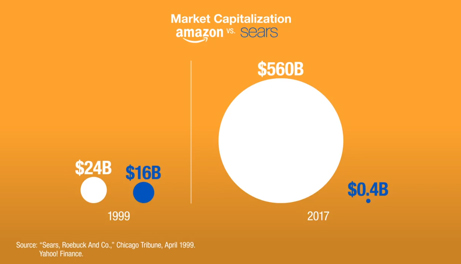
Scott Galloway, L2 Inc. December 2017
“What we said for years, going back to the beginning of so called Quantitative Easing in America was that it was not Quantitative Easing, it was Quantitative Diseasing (...) and that Quantitative Easing as it is called is always contractionary and deflationary, and that we’re having a bull market and economic expansion DESPITE it, not BECAUSE of it."
Ken Fisher, Fisher Investment Capital Markets Update: Summer 2017
|
"Means become ends and ends become means. Consequently, the original goals of such organizations are now considered to be nothing more than obstacles on the way to realizing new aims (...) the collective perpetuates its existence, regardless of whether it has any role left and how well it functions."
Sam Vaknin, Lidija Rangelovska, Malignant Self-love: Narcissism Revisited, 10th edition, 2015 |
Bad Things That Didn't Happen in 2017
A look at the false fears that weren’t
Fisher Investments MarketMinder, December 28, 2017
Retail's Anti-Christ
Market Value Today vs. 2006
Scott Galloway, NYU, December 2017
Changes at the Top
The Five Largest Companies: Now vs. 2006
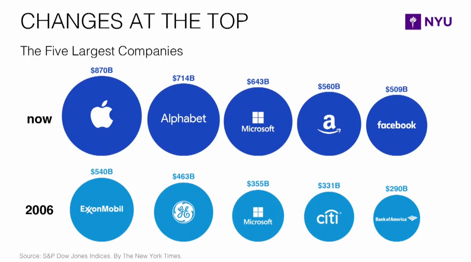
Scott Galloway, NYU, December 2017
The economics of aesthetics and record prices for art since 1701
Christophe Spaenjers, William N. Goetzmann, Elena Mamonova, Explorations in Economic History, July 2015
Devil’s in the Details: Robo Analysts, Financial Footnotes, and Buried Insights
"In all honesty, real fundamental analysis hasn’t mattered since before the tech bubble, but the industry is running out of ways to avoid doing this research. Consequently, what we’re seeing now is a return to fundamental research."
Prattle, December 14, 2017
Baseball Thoughts
"Baseball is about losing most of the/your time; for all the audience cheering and TV noise its natural pace is laconic."
Anonymous and Stefan Jovanovich, Daily Speculations, October 23, 2017
How Japan remained on the Gold Standard despite unsustainable external debt
Giovanni B. Pittaluga, Elena Seghezza, Explorations in Economic History, January 2016
The Rise of the Yuan and The End of the Oil Exchange Standard
"Global currencies don’t so much fail as they are eclipsed by a stronger competitor."
Michael Howell, CrossBorder Capital, November 29, 2017
Returns are almost never average
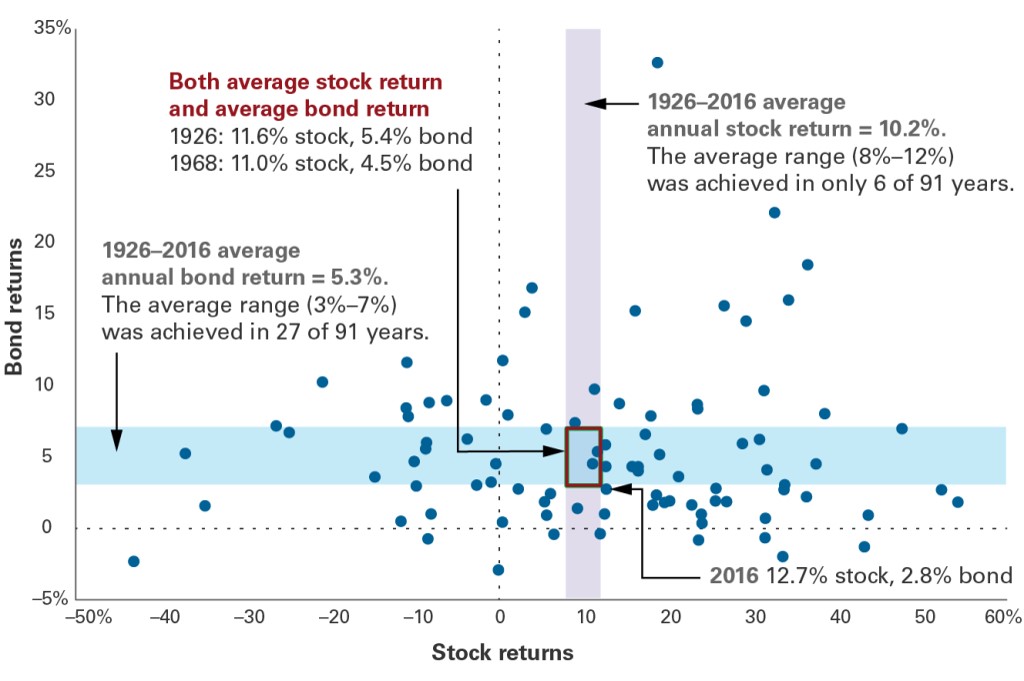
Donald Bennyhoff, Vanguard Blog, What’s your benchmark for investment success? November 16, 2017

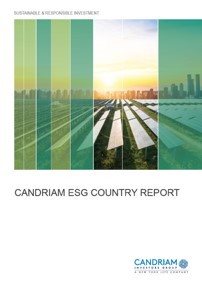 |
In this report, SRI team analysed and scored 123 countries in terms of how sustainably they manage their Human, Natural, Social and Economic Capital.
74 countries were categorised as investible and 49 were categorised as non investible.
|

EN |
“But underneath that shift, which is undoubtedly real, perhaps there’s another shift, away from the consumption of material things in general, and towards the consumption of experiences. Away from the tangible towards the intangible." Read more...
Fathom Consulting, Thank Fathom it’s Friday – Are we living in a material world? October 27th, 2017
The First Billion-Dollar Company
It was only back in 1970 that the capitalization of the entire United States stock market hit $1 trillion and soon a single company may be worth that much. This raises the question, what was the first company to be worth $1 billion?
Dr. Brian Taylor, Global Financial Data, 15 November 2017
|
"It’s amazing how quickly I have already sort of become accustomed to it and how quickly I feel confident in what I can do when I am in it. It’s sort of like "I HAVE BECOME THE CAR"!".
Doug DeMuro, Here's Why the Lamborghini Huracan Is Worth $250,000, December 20, 2016
|
The Wisdom of Trees:
Walt Whitman on What Our Silent Friends Teach Us About Being Rather Than Seeming.
Maria Popova, Brain Pickings, November 2017
Volatility (or Lack Thereof) Isn’t Predictive
"While it’s tempting to think danger lurks under still waters—and financial media provide prompts aplenty—calm periods don’t portend big price movements ahead. Nor do they herald further tranquility. Volatility—low or high; up or down—is incapable of foretelling the future."
Fisher Investments Editorial Staff, Fisher Investments MarketMinder, November 16, 2017
Money Machines: Understanding AI-Powered Investment Research
Prattle is pleased to publish this interview with Erez Katz, CEO and co-founder of Lucena Research, focusing on how machine… Read More
Prattle, November 16, 2017
Data Brand Dependence
If it is a day ending in “y” you can be sure there is somewhere in the financial press a story or “news report” of the looming bond selloff – even if it is due to some future event or made up phenomenon.
Jeffrey P. Snider, Alhambra Investment Partners, November 9, 2017
$106,000 for coffee? Let’s talk compounding
Most of my five children enjoy drinking coffee. Not just any old cup of joe, mind you, but a premium cup of java from one of the popular coffee chains. When they place their orders, it sounds like they’re speaking in a foreign language.
Fran Kinniry, Vanguard Blog, May 25, 2017
Hoshinoya Tokyo: a ryokan in the city
in Tokyo
Aiste Miseviciute, Luxeat.com, 8 November 2017
|
"You know, good things seem to happen when I leave. No matter where I am, wonderful things take place, after I’m gone."
Larry David on Late Night with Seth Meyers, September 27, 2017
|
Pension asset allocation, P7 in 2016
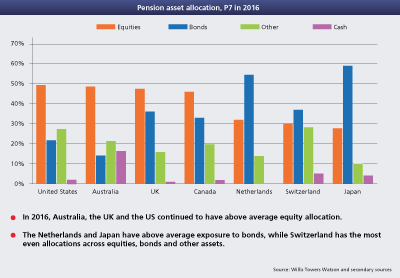
Global Pension Assets Study 2017, Willis Towers Watson and secondary sources
“The Bank will continue with "Quantitative and Qualitative Monetary Easing (QQE) with Yield Curve Control,” aiming to achieve the price stability target of 2 percent, as long as it is necessary for maintaining the target in a stable manner."
Bank of Japan, Statement on Monetary Policy, September 21, 2017
Global pension assets
Evolution 2006-2016 - USD billion
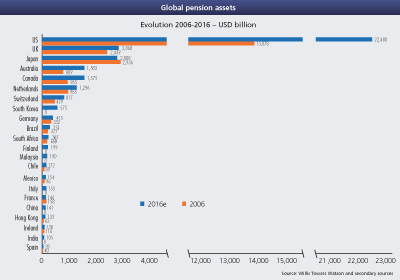
Global Pension Assets Study 2017, Willis Towers Watson and secondary sources
Japanese Monetary Policy In A Chinese-Dominated World.
Or Why The Yen Has Changed Regime And How Japan Should Behave More-and-More Like An Emerging Market?
Michael Howell, CrossBorder Capital, September 2017

“We’ll Live To 100 – How Can We Afford It” New World Economic Forum white paper, in collaboration with Mercer
How well prepared are we to support ourselves and future generations in old age? A new report from the World Economic Forum (WEF), in collaboration with Mercer, We’ll Live To 100 - How Can We Afford It? provides a disconcerting view. More... |
|
“So it's not so much that banks are gonna gain or loose, they'll just become unnecessary.”
NYU Stern finance professor David Yermack, The Innovation Is the Blockchain, L2inc, Sep 21, 2017
|
This Is Not the Financial Crisis’s 10-Year Anniversary
10 years ago today, France’s largest bank froze three hedge funds as subprime-panicked investors fled. Headlines globally are calling this the beginning of the Global Financial Crisis, and at first blush, it certainly has all the trappings. Packaged subprime mortgages, a run on a bank, a liquidity crunch and hard-to-value assets.
Elisabeth Dellinger, Fisher Investments MarketMinder, August 9, 2017
Some Global Odd & Ends
When it comes to central bank experimentation, Japan is always at the forefront. If something new is being done, Bank of Japan is where it happens. In May for the first time in human history, that central bank’s balance sheet passed the half quadrillion mark. It should be unsettling where a trillion is a rounding error.
Jeffrey P. Snider, Alhambra Investment Partners, July 3, 2017
The Bank Bubble of 1929
"In reality, the bull market of the 1920s had more of an impact upon utility stocks and bank stocks than it did on industrial and railroad stocks."
Dr. Brian Taylor, Global Financial Data, June 3, 2017
The Basis For The Changing Basis
It is simply the nature of modern Economics to get most things backward. Positive Economics particularly in the form of econometrics has been like a declaration of ignorance, where Economists have formally decided to try and understand as little as possible.
Jeffrey P. Snider, Alhambra Investment Partners, 28.03.2017
Global Demographic Trends Shape Policy Environment
"Demographics are key determinants of what is economically feasible at both the global and national levels. Demographics also have important implications for monetary policy. Slower population and labor force growth in the coming decades will have a depressing effect on real interest rates."
Mark A. Wynne, Economic Letter, Federal Reserve Bank of Dallas, July 2016
An Interesting Forecast for Interest Rates
"While inflation expectations do influence long rates, as lenders demand a higher return to compensate for the loss of purchasing power, we don’t think the logic supporting the outlook for rising rates holds. From a high level, markets often go against the consensus and do what few anticipate."
Fisher Investments Editorial Staff , Fisher Investments MarketMinder, March 17, 2017
Reality May Soon Overtake Post-Election Equity Rally
The reality of politics collides with the optimism of the campaign
Krishna Memani, Oppenheimer Funds, February 28, 2017
Positive Feedback Loop
"Good luck being bearish on humans for any extended period of time."
Jared Dillian, Mauldin Economics, The 10th Man, March 16, 2017
|
“Many of the jobs that AI will destroy – like credit scoring, language translation, or managing a stock portfolio – are regarded as skilled, have limited human competition and are well-paid. Conversely, many of the jobs that AI cannot (yet) destroy – like cleaning, gardening, or cooking – are relatively unskilled and are low-paid.”
Dhaval Joshi, The Inflation Paradox, BCA Research, Feb 23, 2017 |
|
"What production would you absolutely not like to participate in? Oh, accounting, or anything with numbers, anything where you can't lie...you know what I mean, you can't lie, the figures don't lie!"
Inside the Actors Studio with Jay Leno, March 19, 2015
|
Stock Market Provides Imperfect View of Real U.S. Economy
"The stock market—through measures such as the Standard & Poor’s 500—is often thought to be an economic bellwether. However, market volatility compromises the reliability of such indexes."
Julieta Yung, Economic Letter, Federal Reserve Bank of Dallas, May 2016
|
“It turns out 2007 may in time be understood as the single greatest technological inflection point since Gutenberg invented the printing press. And we completely missed it, because of 2008."
Thank you for being late: Remarks by Thomas L. Friedman on December 15 2016, the Brookings Metropolitan Policy Program
|
Fake News: Yellow Ain't Mellow
Fake news isn’t new. It was around over 100 years ago. Back then, they called it “Yellow Journalism.”
Michael Hanson, Fisher Investments MarketMinder, March 2, 2017
|
"What does space smell like?
Astronaut Chris Hadfield answers your questions"
PBS NewsHour, 13.11.2013
|
A Possible Leadership Rotation in 2017?
"While investor sentiment has been slow to warm in America in this bull market, Europe (and, specifically, the eurozone) is even further behind."
Fisher Investments Editorial Staff, Fisher Investments MarketMinder, March 1, 2017
|
“The fact that models can deliver only an approximation of the truth means that conducting monetary policy is not a mechanical exercise. It is a complex blend of art and science—in effect, it is an exercise in risk management." Building the next generation of economic models is a priority for the Bank of Canada, Governor Poloz says, 31 January 2017
|
They say nothing beats a home-cooked meal
Comparing price inflation of food at home and away from home
Christian Zimmermann, The FRED® Blog, February 2, 2017
Benjamin Harrison and the Terrible Tariff
"The Smoot-Hawley Act of 1930 is blamed for intensifying the Great Depression, and the lesser-known McKinley Tariff of 1890 provides an instructive lesson on how protectionist policies can impact the stock market and politics."
Dr. Brian Taylor, Global Financial Data, January 25th 2017
|
You can probably tell me what brand coat you have on, but can you tell me what brand of knife you used to prepare dinner last night? According to Jay Patel, owner of London-based Japanese Knife Company, the knife is humankind’s most valuable and underrated tool.
Aiste Miseviciute, Luxeat.com 31 January 2017
|
The FOMC policy rate projections versus reality
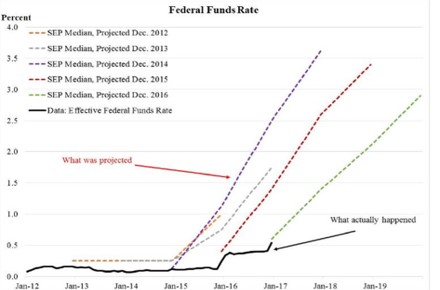
James Bullard, FRB-St. Louis, Jan. 12, 2017
The Future of Energy Prices: Lessons from 750 Years of History
"... for most of history, commodity prices stayed the same for periods of several centuries. It was mainly in the 1500s and the 1900s that the world experienced irreversible increases in commodity prices."
Dr. Brian Taylor, Global Financial Data, January 5th 2017
|



